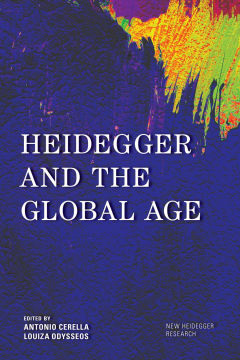
Additional Information
Book Details
Abstract
Globalization is one of the most contested and (ab)used concepts of our time. Whether one interprets it as a ‘collective illusion’ or as the final stage of capitalism, as ‘uncontrollable multitude’ or as a radical opening of new spaces of freedom, the ‘global age’ represents the conceptual and existential background of our being-in-the-world. But what lies behind this process? What mode of human existence is brought about by the age of technology and ‘global mobilization’? And is it possible to attempt a unitary interpretation of this age that presents itself as both total and pluralistic?
This volume rethinks these epochal questions in light of Martin Heidegger’s complex hermeneutics, proposing at the same time that such questions enable the interrogation of some of its most fundamental aspects: the metanarrative of Seinsgeschichte as withdrawal of Being; the structure of human existence within the frame of technology; the relation between humanism and nihilism, as well as politics and technology; the changing character of subjectivity in the ‘age of the world picture’; the mythopoeic force of art and the uprooting of human beings. As this volume shows, interrogating Heidegger’s thought has significant potential for both International Political Theory and also the analysis of specific concepts and dynamics in contemporary international studies, such as the changing character of spatiality, temporality, and subjectivity
This is indispensable and precious reading for those who wish to question globalization as a site of metaphysical, rather than merely economic, crisis. Whether critically or analytically, this illuminating collection of essays engages with Heidegger’s view of the global age as a form of existential decay, in which human life is encapsulated within the new global techno-sphere, and the finite resources of the Earth are constantly exploited by an infinite will to power. The stakes are clear: what remains of freedom and the capacity for action in this process?
Miguel de Beistegui, Professor of Philosophy, University of Warwick, UK
Heidegger and the Global Age is a unique confrontation with globalization as a philosophical problem and not just an economic or socio-political issue. Here Cerella and Odysseos gather a scintillating symposium of experts who bring Heidegger’s notion of Gestell to bear on topics of ethics, ecology, political Islam, urbanization, and much more—a rich panoply of questions to shake us awake as "the wasteland grows.”
Thomas Sheehan, Professor of Religious Studies, Stanford University
In this book, perhaps for the first time, Heidegger’s philosophy is analyzed in light of the global dynamics that characterize contemporary experience. How does Heidegger think the globalized world? And how does globalization radically mark Heidegger’s thinking? In answering this double question, the great Heideggerian themes of metaphysics and politics, history and art open themselves up to new problems and interpretations.
Roberto Esposito, Professor of Theoretical Philosophy, Scuola Normale Superiore, Italy
Antonio Cerella is Senior Lecturer in Politics, International Relations and Human Rights in the Department of Politics at Kingston University, London.
Louiza Odysseos is Professor of International Relations in the School of Global Studies, University of Sussex.
Table of Contents
| Section Title | Page | Action | Price |
|---|---|---|---|
| Heidegger and the Global Age | Cover | ||
| Contents | vii | ||
| Acknowledgements | ix | ||
| List of Contributors | xi | ||
| Editors’ Note | xv | ||
| Introduction: De-Framing the Global | 1 | ||
| Part I: Inside the Global: Enframings | 23 | ||
| 1 Devastation | 25 | ||
| 2 Transnational Islamist Militancy and Heidegger’s Meditations on Technology | 43 | ||
| 3 Environmental (In)Action in the Age of the World Picture | 63 | ||
| 4 Heidegger and Žižek: On Political and Non-Political Action at the End of History | 81 | ||
| Part II: Across the Global: Influences | 107 | ||
| 5 Images of the World: Ontology and History in the Work of Foucault, Schmitt and Heidegger | 109 | ||
| 6 Heidegger on Willpower and the Mood of Modernity | 137 | ||
| 7 Who Is the Peasant Woman Who Trudges through the Fields? Provincializing Eurocentric Artistic Space | 161 | ||
| 8 Heidegger’s Hegel, the Christian Jew: ‘Europe’ as ‘Planetary Criminality and Machination’ | 187 | ||
| Part III: Outside the Global: Crossings | 213 | ||
| 9 Thinking the Clearing in the Age of the Earth System: Heidegger and ‘Cities Like Forests’ | 215 | ||
| 10 Dwelling Politically: Reading Heidegger in the Anthropocene | 233 | ||
| 11 A Universal Right to Politics: Thinking Heidegger’s Gelassenheit in the Age of the Global Refugee Crisis | 253 | ||
| 12 The Quest for Global Ethics after the Decolonial Challenge: Potentialities of Heidegger’s Thought | 269 | ||
| 13 World Order and Abendland: Heidegger on Global Renewal | 297 | ||
| Index | 315 |
